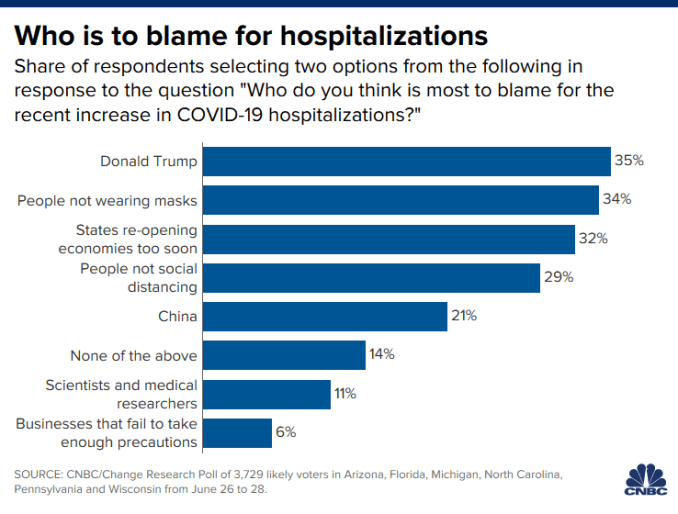
Dow futures were pointing to about a 200 point decline at Wednesday’s open as the third quarter on Wall Street begins with hopes of a repeat of the past three months despite surging U.S. coronavirus cases.
- The Dow Jones Industrial Average shot up more than 200 points, or nearly 1%, on Tuesday to close out the second quarter with an almost 17.8% advance for its best quarterly gain since early 1987.
- The S&P 500′s nearly 20% second-quarter increase was the best since late 1998.
- The Nasdaq’s more than 30% second-quarter gain was the best since late 1999.
- As of Tuesday’s close, the Nasdaq logged the only positive first half of the year, with a 12% advance in 2020.
- The Dow and S&P 500 finished the first half lower, with declines of 9.5% and 4%, respectively, so far this year.
- The Dow, S&P 500 and Nasdaq were all positive in June heading into the first day of July.
Key to the market Wednesday: ADP’s June private-sector jobs report shows a slightly lower-than-expected gain of 2.37 million positions at U.S. companies after an upwardly revised loss of nearly 3.07 million in May. The government delivers its monthly employment report a day early on Thursday and its regular Thursday look at weekly jobless claims. The stock market is closed Friday in observance of the July Fourth holiday.
Shares of FedEx were soaring 15% in Wednesday’s premarket after a surge in pandemic-fueled home deliveries helped the package giant post better-than-expected quarterly earnings and revenue. However, the coronavirus crisis did hurt business, with adjusted fiscal fourth-quarter profit cut in half to $2.53 per share and revenue slipping just over 2% to $17.4 billion.
2. Democrats drive PPP extension passage in Senate
Democrats drove passage in the GOP-controlled Senate of a temporary extension to the small business Paycheck Protection Program through Aug. 8. The unexpected development late Tuesday came just hours before the federal loan program was set to expire with about $130 billion still left to be allocated. The bill, which now goes to the Democratically controlled House, would need President Donald Trump’s signature. The PPP was created as part of the $2.2 trillion economic rescue package in March. It was modified twice since.
3. Fauci says new cases could ‘go up to 100,000 a day’
White House health advisor Dr. Anthony Fauci, in Senate testimony Tuesday, painted a bleak outlook for America’s ability to halt the recent spikes in Covid-19 cases. “We are now having 40-plus-thousand new cases a day. I would not be surprised if we go up to 100,000 a day if this does not turn around, and so I am very concerned,” he said.
The top U.S. infectious disease expert also said he sees “characteristics” of the 2009 H1N1 virus and 1918 flu pandemic in a new influenza strain in China. The 1918 flu, which Fauci has often compared with Covid-19, is estimated to have killed 30 million to 50 million people, according to the CDC.
4. Half the new cases come from just four states
The nation’s recent swell of new coronavirus cases to about 40,000 every day is almost double the daily infections seen in mid-May. It’s being largely driven by outbreaks in states across the South and West. Fauci said about 50% of all new cases are coming from just four states: Florida, California, Texas and Arizona. New York is adding eight additional states to its travel advisory, now requiring travelers arriving there from 16 states to quarantine for 14 days. The order was first issued alongside New Jersey and Connecticut last week.
5. Swing state voters give Trump dismal coronavirus marks
Voters in six 2020 swing states largely disapprove of how Trump is handling the coronavirus crisis, a CNBC/Change Research poll finds. the president was blamed by 35% of the respondents for the recent increase in Covid-19 hospitalizations, followed closely by people not wearing masks and states reopening economies too soon.

Democrat Joe Biden is widening his lead over the president in Arizona, Florida, Michigan, North Carolina, Pennsylvania and Wisconsin. The survey, which comes as several states have scaled back or paused their reopening plans due to surging infections, also shows challenges for Republicans running in Senate races in Arizona, Michigan and North Carolina.




























